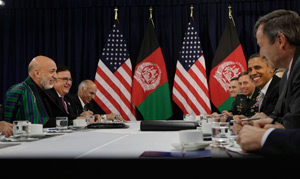Political Transitions in Afghanistan
On April 14, 2011, USIP hosted Dr. Abdullah Abdullah for a discussion on the security and political transitions in Afghanistan.
Read the event analysis, A Voice from the Opposition: The Way Ahead in Afghanistan
 In mid-March, President Hamid Karzai announced those areas of Afghanistan that will be handed over to Afghan Security Forces in 2011 as part of the transition strategy which aims for the withdrawal of international forces by 2014. As the country gears up for the 2014 presidential elections and with Karzai's calls for a loya jirga to decide the post-2014 role of America in Afghanistan, concerns regarding the security and political transition, and how to establish a sustainable peace in Afghanistan, must be addressed.
In mid-March, President Hamid Karzai announced those areas of Afghanistan that will be handed over to Afghan Security Forces in 2011 as part of the transition strategy which aims for the withdrawal of international forces by 2014. As the country gears up for the 2014 presidential elections and with Karzai's calls for a loya jirga to decide the post-2014 role of America in Afghanistan, concerns regarding the security and political transition, and how to establish a sustainable peace in Afghanistan, must be addressed.
On April 14, 2011, USIP hosted Dr. Abdullah Abdullah for a discussion on these political questions, focused specifically on the inherent challenges in these transitional processes and his insights on the way forward in Afghanistan for political institutions and the international community.
Speakers
- Dr. Abdullah Abdullah
Afghanistan Democratic Opposition Leader, Chairman
Afghanistan Coalition for Change and Hope - Tara Sonenshine, introduction
Executive Vice President
U.S. Institute of Peace - William Taylor, moderator
Senior Vice President, Center for Conflict Management
U.S. Institute of Peace
Explore Further
- Read the Special Report, "Making Peace in Afghanistan"
- Countries and Regions: Afghanistan
- Center for Post-Conflict Peace and Stability Operations
If you are interested in this event, you may also be interested in the following Academy Courses:
- Governance and Democratic Practices in War to Peace Transitions
- Social Reconstruction and Human Security
- Economic Reconstruction in Conflict-Affected States



